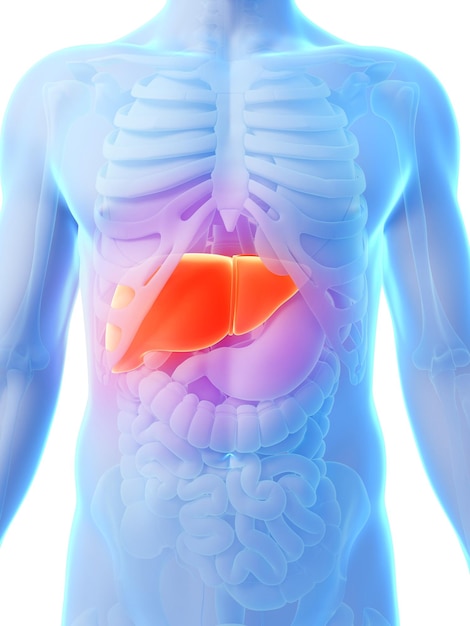The Location and Purpose of the Liver
The liver is the largest gland in the body, situated at the beginning of the small intestine. In comparison, the gallbladder is located behind the liver, near its base. The liver’s primary function is to produce bile, an essential secretion that breaks down digested lipids into smaller particles, allowing fats and fat-soluble vitamins to be absorbed by the small intestine.
Bile is formed in the liver from water, electrolytes, and other molecules, including cholesterol, bilirubin, bile acids, and phospholipids. Adults produce between 400 and 800 ml of bile daily, which is stored in the gallbladder until needed. Besides manufacturing bile, the liver acts as a filter to detoxify and remove harmful chemicals, such as alcohol, from the body.
What are Liver Stones?
Liver stones typically form when there is an excess of cholesterol in the body. Excess dietary cholesterol often crystallizes into small, pebble-shaped masses. Researchers in Germany have found that heredity may also play a role in this condition, having isolated a gene that significantly increases the likelihood of forming liver and/or gallstones.
General Statistics about Liver Concerns
Physical injuries to the liver account for only a small percentage of hospital admissions. Pharmacological drug reactions are a common cause of liver injury and can lead to liver disease. Over 900 prescription drugs are known to cause liver injury, with toxicity being the leading reason for withdrawing a drug from the market. Liver and gallstones are present in 10 to 20 percent of the population.
9 Herbs That Promote Liver Cleansing
The top nine herbs that promote liver cleansing include milk thistle seed, chanca piedra, borotutu, reishi mushroom, yellow dock root, dandelion root, turmeric, chicory root, and peppermint leaf. For a more detailed list of these herbs, check out the full article.
4 Common Diseases of the Liver
Given the liver’s role in detoxifying the body, what we eat and drink can significantly impact its health. Here are some common liver diseases:
Cirrhosis: Damage to the liver causes scarring, which prevents it from functioning properly. Common causes include alcoholism and hepatitis. About 5 percent of cirrhosis patients develop liver cancer and may require liver transplants due to excessive scarring.
Fatty Liver: This condition is common in people who consume too much alcohol, leading to an enlarged liver due to fat accumulation. Symptoms usually include slight abdominal discomfort, and the condition often improves if alcohol consumption stops. Non-alcoholic fatty liver disease (NAFLD) presents similar symptoms but is not caused by alcohol. It is often related to insulin resistance (type 2 diabetes) and obesity, so weight loss and managing carbohydrate intake can be helpful.
Hepatitis: Alcoholic hepatitis, caused by excessive alcohol intake, often precedes cirrhosis and liver failure. Early detection can somewhat reverse liver damage. Viral hepatitis directly attacks the liver, with several different types existing.
Gilbert Syndrome: This condition is caused by a defect in the uptake of bilirubin into liver cells. It can be difficult to identify and is sometimes confused with liver disease.
Symptoms of a Sluggish Liver
When your liver isn’t functioning optimally, you may experience symptoms such as chronic fatigue, depression, headaches, constipation, digestive difficulties, and chemical sensitivities. Interestingly, these symptoms are similar to those experienced by patients exposed to toxic chemicals.
Can Any Organisms Harm the Liver?
Yes, liver flukes (Trematodes) are flatworms that infect the digestive system and other organs. They attach and leech nourishment using external suckers. Trematodes typically enter the body through consuming uncooked fish or plants from fluke-infested waters.
Trichinosis, another parasitic disease, is contracted from eating undercooked meat (usually pork) and affects the bile ducts that drain the liver. Schistosomiasis occurs when parasites enter the body through the skin, often from walking barefoot in infested freshwater. These organisms travel through the body, settling in the small veins of the liver, ultimately causing cirrhosis due to inflammation-induced scarring. Hepatitis A, a virus that enters the liver, is commonly contracted by consuming food handled by someone who didn’t wash their hands thoroughly after using the bathroom.
What Diet Promotes A Strong Liver?
A poor diet is a major contributor to most liver conditions, with high alcohol intake being the most common dietary danger. Improving your diet can significantly promote liver function. A diet too high in protein may cause hepatic encephalopathy or “mental confusion,” possibly due to excessive ammonia formation during protein digestion. Always consult your doctor before altering your protein intake.
A diet high in calories, especially carbohydrates and trans and saturated fats, can also lead to liver concerns, as excess caloric intake can cause fatty deposits in the liver. Watch your Vitamin A intake, as it can be toxic to the liver in large amounts. Emulsified vitamin A, derived from carotene in vegetables and egg yolk, is a safer option and a powerful antioxidant that supports cell differentiation and the immune system.
The best diet for the liver is low in protein and sodium, with plenty of raw fruits and vegetables to prevent overtaxing the liver. About 30 to 40 percent of your diet should consist of dark green leafy vegetables and colorful fruits and vegetables. Reducing trans and saturated fats is crucial for liver health. Avocados and raw seeds like flaxseed, sunflower, and alfalfa seeds are excellent for liver health. Certain oils, such as primrose, black currant seed, and cold-pressed olive oil, also support liver function.
Choosing a Liver Cleansing Supplement
Along with a healthy diet, regularly cleansing your liver is essential for optimal function and health. Many liver and gallbladder cleansing products are available in health stores and online. The most effective ones are made with organic and wildcrafted herbs and produced using proprietary processes. Liver cleansers made with these methods, such as Liver Health, use vegetable glycerin instead of alcohol for extraction, making them the safest and most effective supplements for supporting your health improvement initiatives.

